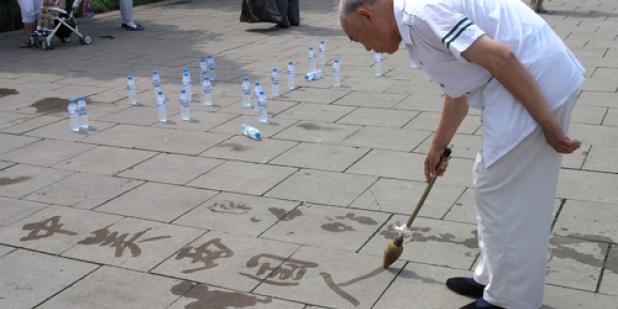Join us for a free one-day workshop for educators at the Japanese American National Museum, hosted by the USC U.S.-China Institute and the National Consortium for Teaching about Asia. This workshop will include a guided tour of the beloved exhibition Common Ground: The Heart of Community, slated to close permanently in January 2025. Following the tour, learn strategies for engaging students in the primary source artifacts, images, and documents found in JANM’s vast collection and discover classroom-ready resources to support teaching and learning about the Japanese American experience.
USCI's look at "The Future of U.S. - China Relations"
International conference launches new USC institute focusing on U.S. – China relations

What does
International conference launches new USC institute focusing
on
April 19, 2007,
View a video and summary of the event.
What: 1. “The Future of U.S. – China Relations” conference features 25
distinguished scholars examining the multidimensional and
evolving
Topics: State to State Relations in a Changing Economic Environment
Prospects for Political Reform
Social and Economic Disparity
Energy and Environmental Concerns
Cultural and Intellectual Trends
2. Herbert G. Klein Lecture by Ambassador J. Stapleton Roy
When: Conference
Friday, April 20, 2007: 9:30 am – 5 pm
Saturday, April 21, 2007: 9 am – 2:30 pm
Klein Lecture
Friday, April 21, 2007: 6 – 7:30 pm
Where:
USC University Park Campus
Enter gate 3, Figueroa, south of Jefferson
Directions available at:
http://www.usc.edu/about/visit/upc/driving_directions
Who: USC
Website: china.usc.edu
Phone: 213-821-4382 / Fax: 213-821-2382
Complete speaker list below.
The
The outlines of
This economic success has helped
Enormous internal migration has enabled the staffing of factories and mines. Perhaps 200 million Chinese have left their village homes for the cities, the largest movement of people in world history. This has divided families and generated child care, education, health care, occupational safety, and many other challenges.
Tremendous problems confront the Chinese. Corruption, underemployment, escalating energy needs, and environmental degradation are among these. To highlight two of these,
Along with these massive economic and demographic changes, the expansion of telecommunications (more than 300 million Chinese have cell phones and at least 150 million Chinese are logging in to the internet) and greater openness has permitted people in
In an effort to increase its flexibility, the Communist Party-led state has experimented with reforms, including village-level elections. The leadership is sensitive to the widening social and economic disparities and has launched campaigns to “put people first,” to develop the relatively poor Western regions of
To explore these changes and to debate what they mean for the
Contacts: Clayton Dube, mailto:cdube@usc.edu / 213-821-3936
Linda Truong, mailto:lntruong@usc.edu / 213-821-4382
List of presentations and speaker biographies available at the USCI website:
Speakers:
Ambassador J. Stapleton Roy – Keynote Address (Friday, 6 – 7:30 pm)
Geremie Barmé (
Carolyn Cartier (
Warren Cohen (
David Dollar (World Bank) – paper presented, not able to attend
June Teufel Dreyer (
Elizabeth Economy (Council on Foreign Relations)
Richard Louis Edmonds (
C. Cindy Fan (UCLA)
Edward Friedman (
Merle Goldman (
Guo Liang (
C. Anderson Johnson (USC)
Harry Harding (Eurasia Group)
Eric Heikkila (USC)
Daniel Lynch (USC)
Andrew Nathan (
Kevin O’Brien (UC Berkeley)
William Overholt (
Orville Schell (UC Berkeley)
Wang Shaoguang (
Zhao Suisheng (
David Zweig (
Featured Articles
Please join us for the Grad Mixer! Hosted by USC Annenberg Office of International Affairs, Enjoy food, drink and conversation with fellow students across USC Annenberg. Graduate students from any field are welcome to join, so it is a great opportunity to meet fellow students with IR/foreign policy-related research topics and interests.
RSVP link: https://forms.gle/1zer188RE9dCS6Ho6
Events
Hosted by USC Annenberg Office of International Affairs, enjoy food, drink and conversation with fellow international students.
Join us for an in-person conversation on Thursday, November 7th at 4pm with author David M. Lampton as he discusses his new book, Living U.S.-China Relations: From Cold War to Cold War. The book examines the history of U.S.-China relations across eight U.S. presidential administrations.




